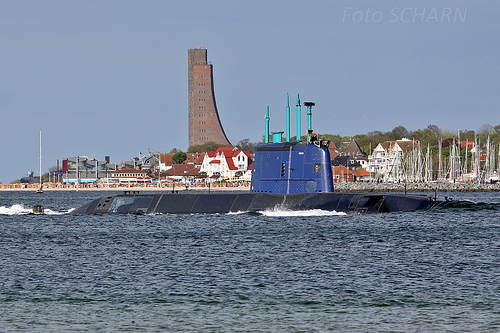Rüstungsexporte 2014: Deutschland erhöhte gegen den Trend, russische Unternehmen holen deutlich auf
Der Waffenexport der Rüstungsunternehmen in den USA und Westeuropa ist im vergangenen Jahr erneut leicht zurückgegangen – aber Deutschland ist die Ausnahme: Während die Ausfuhren der westeuropäischen Verteidigungsindustrie 2014 um 7,4 Prozent sanken, legten die Exporte deutscher Firmen um 9,4 Prozent zu, wie aus der neuesten Statistik des schwedischen Friedensforschungsinstitutes SIPRI hervorgeht. Grund dafür ist die Ausfuhr eines U-Bootes für Israel, gebaut von ThyssenKrupp Marine Systems (TKMS). Insgesamt dominieren weiterhin die US-Firmen den Rüstungsmarkt, gefolgt von den Westeuropäern. Ihre insgesamt leicht zurückgehenden Exporte werden aber zunehmend durch Ausfuhren vor allem aus Russland, aber auch von Unternehmen in asiatischen Ländern ausgeglichen, die ihre Ausfuhren insgesamt erhöht haben.
Der Anstieg der deutschen Exporte – dem finanziellen Volumen nach – kommt nicht überaschend. Bereits im Rüstungsexportbericht für 2014 hatte die Bundesregierung darauf verwiesen, dass das U-Boot für Israel als größter Einzelposten die Summe der tatsächlichen Ausfuhren 2014 auf 1,283 Milliarden Euro erhöht hatte.
Die größten Steigerungen verzeichneten SIPRI zufolge die russischen Unternehmen. Ihr Umsatz stieg von 2013 bis 2014 um fast 50 Prozent; nunmehr sind elf gegenüber zuvor neun Firmen aus Russland unter den 100 größten Rüstungsunternehmen zu finden.
Aus der Mitteilung des schwedischen Institus:
Sales of arms and military services by the largest arms-producing companies—the SIPRI Top 100—totalled $401 billion in 2014 according to new international arms industry data launched today by the Stockholm International Peace Research Institute (SIPRI).
For the fourth consecutive year, sales of arms and military services by the SIPRI Top 100—the largest arms-producing companies by arms sales—have decreased. However, with a reduction of 1.5 per cent in real terms between 2013 and 2014, the global decline in SIPRI Top 100 total arms sales remains moderate. Falls in 2014 are due to lower arms sales for companies based in North America and Western Europe, as Top 100 companies located in other regions of the world have collectively increased their arms sales.
Companies based in the United States continue to dominate the Top 100, with a 54.4 per cent share of the total. US companies’ arms sales decreased by 4.1 per cent between 2013 and 2014, which is similar to the rate of decline seen in 2012–13. (…)
Western European companies’ arms sales decreased by 7.4 per cent in 2014. Only German (+9.4 per cent) and Swiss (+11.2 per cent) companies show overall growth in their arms sales in real terms. The rise in German arms sales was due to a significant growth in turnover for German shipbuilder ThyssenKrupp (+29.5 per cent), while Switzerland’s Pilatus Aircraft benefited from growing demand for its trainer aircraft, boosting Swiss sales. The companies representing the seven remaining Western European countries in the Top 100 all show an overall decline in their sales.
Despite difficult national economic conditions, the Russian arms industry’s sales continued to rise in 2014. The number of Russian companies ranked in the Top 100 went up from 9 to 11, amounting to a share of 10.2 per cent of total Top 100 arms sales in 2014. (…)
‘Russian companies are riding the wave of increasing national military spending and exports. There are now 11 Russian companies in the Top 100 and their combined revenue growth over 2013–14 was 48.4 per cent,’ says SIPRI Senior Researcher Siemon Wezeman.
In contrast, arms sales of Ukrainian companies have substantially declined. UkrOboronProm has fallen from 58th position in 2013 to 90th in 2014, with a drop in sales of 50.2 per cent.
Unter den 100 weltweit größten Rüstungsunternehmen finden sich – neben Airbus, das als transeuropäisches Unternehmen auf Platz sieben landete – auf Rang 31 der Landsystemhersteller Rheinmetall, auf Rang 42 ThyssenKrupp, auf Platz 83 der Panzerbauer Krauss-Maffei Wegmann (KMW).
Interessant übrigens: Der französische Landsystem-Hersteller Nexter, dessen Fusion mit KMW geplant ist, aber angeblich wieder infrage steht, rangiert auf Platz 64.
(Die Liste THE SIPRI TOP 100 ARMS-PRODUCING AND MILITARY SERVICES COMPANIES, 2014 hier)
(Archivbild Mai 2013: Das für die israelische Marine bestimmte U-Boot Tanin bei seiner ersten Versuchsfahrt vor Laboe – Foto Helwin Scharn unter CC-BY-SA-Lizenz)




Nur das gar nichts zu sagen hat
den es geht nur um Umsatz Zahlen
China und Russland ist das einiges Billiger , BRD ist relativ Teuer
für ein Dingo kauft man in China 3 Pz
Claudia Roth findet die deutschen Waffenexporte unerträglich…
Sigmar Gabriel findet die deutschen Waffenexporte unerträglich…
Ulrich Grillo findet, man muss alle Länder möglichst gleich gut ausrüsten…
Mir erscheint dieser Bericht doch recht wertlos. Wenn man einen relevanten Spieler wie China mangels Datenlage ausklammert, dann hat man nur damit schon eine Verzerrung, die die Aussagekraft schmälert.
Dann frage ich mich, was man betrachten sollte. Welche Rüstungsexporte sind betrachtenswert? In welche Relation sollte man die setzen? Wenn an Nato-Partner oder Israel Rüstungsgüter geliefert werden, dann ist das für eine Bewertung relativ irrelevant. Die Zahl der Rüstungsexporte an unsichere Kantonisten (Kurden, Saudi Arabien …) erscheint mir wesentlich brisanter. Aber was an die Kurden geht, erscheint gar nicht (oder?), weil aus Bundeswehrbeständen geliefert.
Dann wäre eine Relation Gesamtexporte zu Rüstungsexporten ggf. interessant. Das ist doch in Relation eine marginale Branche. Der Verkauf von Toyota-Pickups (IS-Standardauto) in den Nahen Osten wird sicherheitspolitisch relevanter sein, als manch eine Position in diesem Bericht.
Die Frage der Aussagekraft einer $ Zahl wurde ja schon gestellt. Wie viel Bums für den Dollar gibt es in unterschiedlichen Ländern? Was ist der Unterschied zwischen einer Milliarde für U-Boote und einer Milliarde für AK-47 und Panzer?
So gibt der SIPRI-Bericht relativ wenig Information für eine SiPo-Auseinandersetzung – abseits vom „igitt Waffen“.
Kleine Randnotiz: Das zweite Boot der im Bild gezeigten Dolphin AIP Klasse, die Rahav, wird noch in dieser Woche von Kiel nach Haifa auslaufen.
Richtige Schlagzeile zur falschen SIPRI-Pressemitteilung: Deutschland bleibt Weltmeister beim Export von Rüstungsgütern – der passende prozentuale Anstieg einer absoluten Größe lässt sich als Beleg dieser Tatsachen-These sicher finden. Blöd nur, dass es in dieser SIPRI-Studie nicht um Rüstungsexporte, sondern um Umsätze von Rüstungsunternehmen geht. Die Rüstungsexport-Weltmeister-Studie kommt erst nächstes Jahr wieder – also an die Wiedervorlage denken.